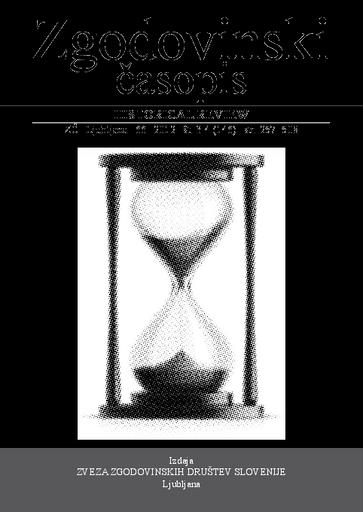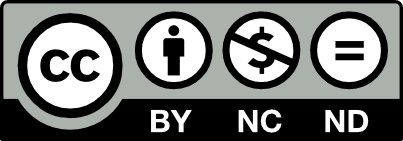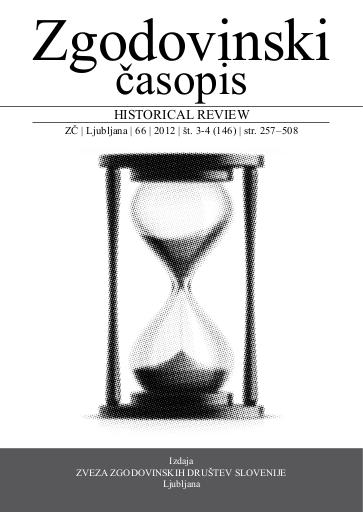
/
Serijske publikacije
/
Zgodovinski časopis
Ideološka in jezikovna reforma pri Hetitih v drugi polovici 13. stoletja pr. n. š

Avtor(ji):Marina Zorman
Soavtor(ji):Peter Štih (odg. ur.), Dušan Mlacović (ur.), Bojan Balkovec (teh. ur.), Nives Sulič Dular (prev.), Peter Vodopivec (prev.), Marc L. Greenberg (prev.), James Shedel (prev.)
Leto:2012
Založnik(i):Zveza zgodovinskih društev Slovenije, Ljubljana
Jezik(i):slovenščina
Vrst(e) gradiva:besedilo
Ključne besede:Hetiti, ideološka reforma, jezikovna reforma, glosni klini, tabu, the Hittites, ideological reform, language reform, gloss-wedges, taboo
Avtorske pravice:

To delo avtorja Marina Zorman je ponujeno pod Creative Commons Priznanje avtorstva-Nekomercialno-Brez predelav 4.0 Mednarodna
Datoteke (1)

Ime:ZC_2012_3-4.pdf
Velikost:4.75MB
Format:application/pdf
Stalna povezava:https://hdl.handle.net/11686/file19096
Opis
V hetitskih klinopisnih besedilih iz druge polovice 13. stoletja pr. n. š. so nekatere besede označene s posebnimi znaki, ki se imenujejo glosni klini. Na osnovi opažanja, da mnoge besede z glosnimi klini označujejo stvari, ki so predmet tabuja že od indoevropskega prajezika dalje, ostale pa so v tesni zvezi s hetitsko ideologijo, lahko s precejšnjo verjetnostjo domnevamo, da je nenadna uvedba glosnih klinov v hetitskih besedilih del širše ideološke reforme, ki je zajela tudi jezik. Dokaz za to je dejstvo, da se mnoge besede z glosnimi klini nanašajo na nesprejemljivo vedenje, ki je v kontekstu označenih besed večkrat tudi izrecno prepovedano.
Metapodatki (12)
- identifikatorhttps://hdl.handle.net/11686/36258
- naslov
- Ideološka in jezikovna reforma pri Hetitih v drugi polovici 13. stoletja pr. n. š
- Ideological and Linguistic Reform among the Hittites in the Second Half of the 13th Century B.C.
- avtor
- Marina Zorman
- soavtor
- Peter Štih (odg. ur.)
- Dušan Mlacović (ur.)
- Bojan Balkovec (teh. ur.)
- Nives Sulič Dular (prev.)
- Peter Vodopivec (prev.)
- Marc L. Greenberg (prev.)
- James Shedel (prev.)
- predmet
- Hetiti
- ideološka reforma
- jezikovna reforma
- glosni klini
- tabu
- the Hittites
- ideological reform
- language reform
- gloss-wedges
- taboo
- opis
- V hetitskih klinopisnih besedilih iz druge polovice 13. stoletja pr. n. š. so nekatere besede označene s posebnimi znaki, ki se imenujejo glosni klini. Na osnovi opažanja, da mnoge besede z glosnimi klini označujejo stvari, ki so predmet tabuja že od indoevropskega prajezika dalje, ostale pa so v tesni zvezi s hetitsko ideologijo, lahko s precejšnjo verjetnostjo domnevamo, da je nenadna uvedba glosnih klinov v hetitskih besedilih del širše ideološke reforme, ki je zajela tudi jezik. Dokaz za to je dejstvo, da se mnoge besede z glosnimi klini nanašajo na nesprejemljivo vedenje, ki je v kontekstu označenih besed večkrat tudi izrecno prepovedano.
- The Hittite cuneiform texts from the second half of the 13th century contain some words that are marked with special characters called gloss-wedges. Based on the observation that many of these words have meanings that had been prohibited since the period of the ProtoIndo-European language onwards, while others were closely related to the Hittite ideology of that period, it may be safely assumed that the sudden introduction of gloss-wedges in Hittite texts was but a part of a wider ideological reform that also affected the language. The fact that many words marked with gloss-wedges refer to unacceptable behavior, which in the context of the marked words was often explicitly prohibited, strongly supports this assumption.
- založnik
- Zveza zgodovinskih društev Slovenije
- datum
- 2012
- 01. 01. 2012
- tip
- besedilo
- jezik
- Slovenščina
- jeDelOd
- pravice
- licenca: ccByNcNd
Seznam literature v delu (24)
| Stran | Avtor | Naslov | Vir | Kraj | Založba | Leto |
|---|---|---|---|---|---|---|
| 272 | Bryce, Trevor R. | Life and Society in the Hittite World | Oxford | Oxford University Press | 2002 | |
| 272 | Cameron, Deborah | Verbal hygiene | London, New York | Routledge | 1995 | |
| 272 | Güterbock Hans, Gustav | Notes on Luwian Studies | Orientalia | 1956 | ||
| 272 | Havers, Wilhelm | Neuere Literatur zum Sprachtabu | Wien | Rudolf M. Rohrer | 1946 | |
| 272 | Güterbock Hans, Gustav ; Harry A., Hoffner | Theo P. J. van den Hout, The Hittite Dictionary of the Oriental Institute o f the University of Chicago | Chicago | The Oriental Institute of the University of Chicago | 1980 | |
| 272 | Hout Theo van, den | Institutions, Vernaculars, Publics: The Case of Second-Millennium Anatolia | Margins of Writing, Origins of Cultures | Chicago, Illinois | The Oriental Institute of the University of Chicago | 2006 |
| 272 | Kronasser, Heinz | Etymologie der hethitischen Sprache Lfg. 1-6. | Wiesbaden | Harrasowitz | 1962 | |
| 272 | Laroche, Emanuel | Dictionnaire de la langue louvite | Paris | Adrien-Maissonneuve | 1959 | |
| 272 | Melchert, Craig H. | Cuneiform Luvian Lexicon | Lexica Anatolica 2. Chapel Hill, [s. n.] | 1993 | ||
| 272 | Melchert, Craig H. | The Luwians | Leiden | Brill | 2003 | |
| 272 | Melchert, Craig H. | The Problem of Luwian Influence on Hittite | Sprachkontakt und Sprachwandel. Akten der XI. Fachtagung der Indogermanischen Gesellschaft, 17.—23. September 2000, Halle an der Saale | Wiesbaden | Dr. Ludwig Reichert Verlag | 2005 |
| 272 | Polenz Peter, von | Deutsche Sprachgeschichte vom Spätmittelalter bis zur Gegenwart. Bd. III. 19. und 20. Jahrhundert | Berlin, New York | Walter de Gruyter | 1999 | |
| 273 | Puhvel, Jaan | Dialectal Aspects of the Anatolian Branch of Indo-European | Ancient Indo-European Dialects. Proceedings of the Conference on Indo-European Linguistics Held at the University of California, Los Angeles, April 25-27,1963 | Berkeley | University of California Press | 1966 |
| 273 | Rosenkranz, Bernhard | Die Stellung des Luwischen im Hatti-Reiche | Indogermanische Forschungen | 1938 | ||
| 273 | Rosenkranz, Bernhard | Luvisch und ‘anatolische’ Sprachen | Forschungen und Fortschritte | 1954 | ||
| 273 | Rüster, Christel ; Erich, Neu | Hethitisches Zeichenlexikon. Inventar und Interpretation der Keilschriftzeichen aus den Bogazköy-Texten | Wiesbaden | Harrassowitz | 1989 | |
| 273 | Schuler Einar, von | Hethitische Dienstanweisungen fü r höhere Hof- und Staatsbeamte | Graz | Im Selbstverläge des Herausgebers | 1957 | |
| 273 | Siefanini, Ruggiero | Towards a Diachronic Reconstruction of the Linguistic Map of Ancient Anatolia | Anatolia Antica: Studi in memoria di Fiorella Imparati | Florence | LoGisma Editore | 2002 |
| 273 | Thomas, George | Linguistic Purism | London, New York | Longman | 1991 | |
| 273 | Uria Varela, Javier | Tabù y eufemismo en latin | Amsterdam | A. M. Hakkert | 1997 | |
| 273 | Yakubovich, Ilya | Sociolinguistics of the Luvian Language | http://oi.uchicago. edu/pdf/yakubovich_diss_2008.pdf | Chicago, Illinois | 2008 | |
| 273 | Zorman, Marina | Sprachtabu als Motiv der Verwendung von Glossenkeilen. I. Wörter von A bis I. | Tabularia Hethaeorum : Hethitologische Beiträge, Silvin Košak zum 65. Geburtstag, 2007, str. 691—708. | Geburtstag | 2007 | |
| 273 | Zorman, Marina | La réforme de la langue hittite au XIII siècle av. J.-C. : un instrument au service de la construction de l’identité’ | Identité et altérité culturelles : le cas des Hittites dans le Proche-Orient ancien. Actes de colloque, Università de Limoges, 27-28 novembre 2008 | Bruxelles | Safran | 2010 |
| 273 | Zorman, Marina | Über die Gründe für die Verwendung von Glossenkeilen im Hethitischen | Acts of the 7-th International Congress of Hittitology | Ankara | 2010 |